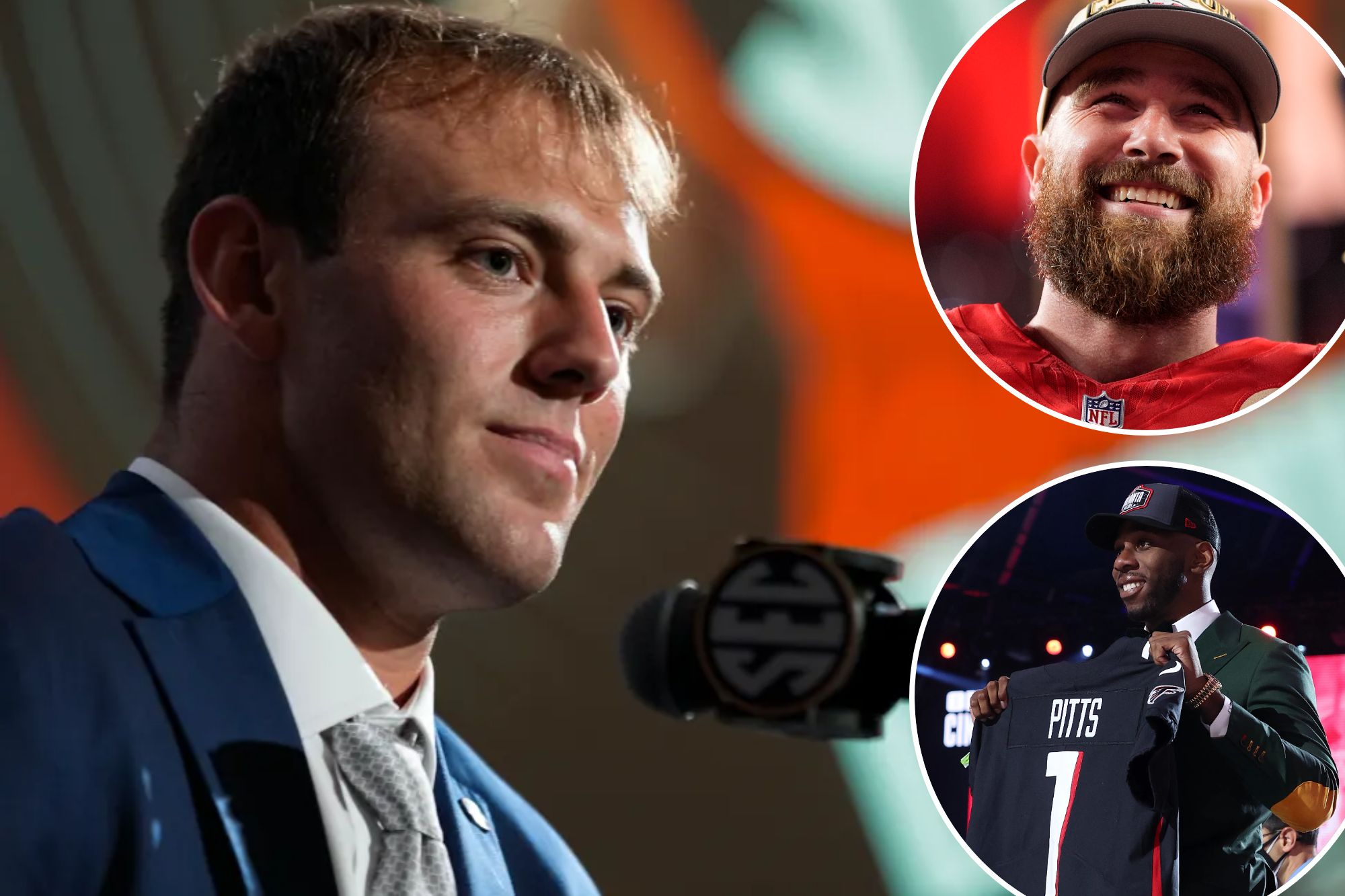
A scouting report on Brock Bowers could rave about his physical abilities in the “pros” column and just list a bunch of other names under the heading for “cons.”
The case for selecting Bowers with a top-10 pick in the NFL draft — as the Jets, with the 10th pick, are thought to be strongly considering come Thursday night — is evident in every video of him creating mismatches across the formation, catching passes with his soft hands, breaking tackles and accelerating past SEC defensive backs for Georgia.
The case against using premium draft capital on Bowers mostly is pinned to the NFL’s inverted tight end history: All-Pros Travis Kelce, George Kittle, Sam LaPorta were not first-rounders, but Noah Fant, O.J. Howard and Hayden Hurst were.
Both lists go on and on over the past two decades.
When the miss rate on first-rounders is alarmingly high and the list of mid- and late-round draft steals is long, does the NFL have a scouting problem at tight end?
“I think the thing that we’ve seen [is] the athletic tight ends maybe have fought the football more than they should have,” said former Buccaneers general manager Mark Dominik, an NFL analyst for Sirius XM. “You have to look at how natural they are catching the ball, and I think that’s a big piece of it.”
Kittle (fifth-rounder) and Kelce (third-rounder) are the poster boys for the argument against over-drafting a tight end, but the list of value picks runs much deeper.
Second-rounders LaPorta, Trey McBride and Cole Kmet and fourth-rounder Jake Ferguson joined Kelce and Kittle as non-first-rounders who finished in the top 10 among tight ends in receptions and yards last season.
The first-rounders in the top 10 of receptions were Evan Engram, David Njoku, Dalton Kincaid and T.J. Hockenson.
For a larger sample size, 13 different tight ends have been voted first- or second-team All-Pros by various outlets since the final selections for regulars Jason Witten and Tony Gonzalez in 2012.
First-rounders Vernon Davis, Greg Olsen and Hockenson are the outliers against second-rounders Rob Gronkowski, Zach Ertz, Hunter Henry and LaPorta, Kelce and fellow third-rounder Jimmy Graham, fourth-rounder Jordan Cameron, Kittle, and sixth-rounders Darren Waller and Delanie Walker.
“I remember we were talking about Kelce in the [2013] draft room and it’s like, ‘Well, he doesn’t block anybody,’ ” Dominik said. “No one cares. The reality is you’re drafting tight ends to go score points, be a problem in the middle of the field, be an outlet for a quarterback [on] screens and all the different things you can do with them. And Brock Bowers does all that to the nines.”
Sounds familiar.
Many of the arguments in favor of Bowers were used three years ago to support the Falcons making Kyle Pitts the highest-drafted tight end in history (No. 4).
Pitts tallied 1,026 yards as a rookie but has struggled to justify his draft status in the two years since quarterback Matt Ryan exited Atlanta.
“Production at the position is still dependent on who is throwing you the ball,” one NFL scout told The Post. “You can get separation, win 50/50 balls, all that good stuff. The guys playing with great quarterbacks have an advantage.”
Pitts might scare some teams off of Bowers, but it doesn’t apply to the Aaron Rodgers-armed Jets.
“The right type of tight end can be a real weapon,” said general manager Joe Douglas, who further alluded to Bowers as a “Swiss Army knife” last week.
No doubt that Douglas’ counterparts felt similarly about most of the 13 first-round tight ends drafted since 2008.
The underachieving collective has combined for 10 Pro Bowl seasons — led by two apiece for Engram, Hockenson and Jermaine Gresham — and one 1,000-yard season (Pitts).
“[Bowers] is one of the 10 best players in the draft,” NFL Network draft analyst and former NFL scout Daniel Jeremiah said. “The challenge is … you look around the league and you see most of these top tight ends that have come on Day 2 — or even beyond that. Teams are now saying, ‘OK, we can find that other tight end. Maybe we don’t get the top guy.’ ”
There are exceptions to every rule, however.
Running back has been the most-devalued first-round position and yet two were top-12 picks in 2023.
Is Bowers an exception?
“Some of these guys don’t have as great a lower-body strength,” Dominik said. “They’re former basketball players … [who] get tackled really easily, so they don’t have the great runs after the catch.
“Brock Bowers does, and I think that’s what really separates him and pulls him to a different level than some of the other first-rounders that haven’t played as well. Functional strength is the thing that probably people miss the most with these tight ends, and Bowers is uniquely difficult to tackle.”














